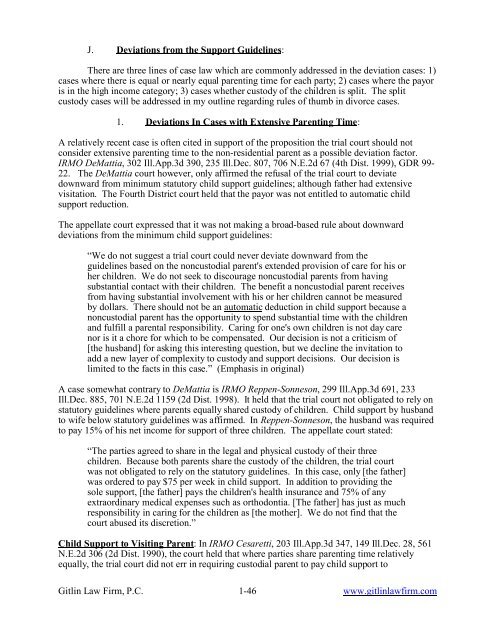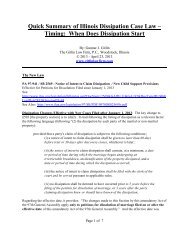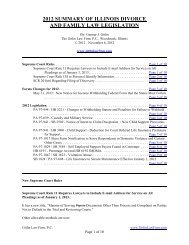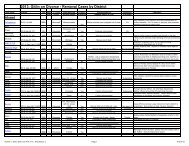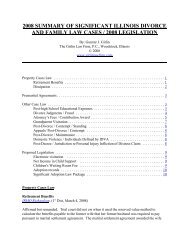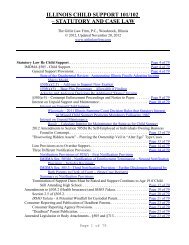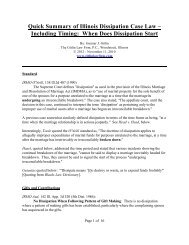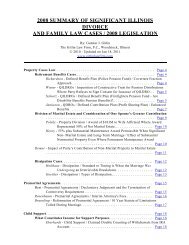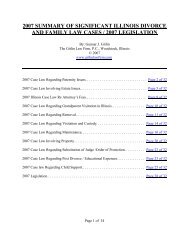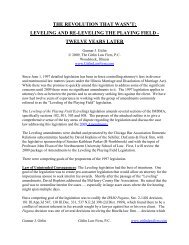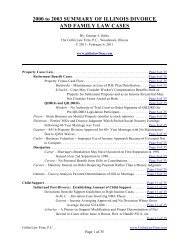child support 101/102 - The Gitlin Law Firm
child support 101/102 - The Gitlin Law Firm
child support 101/102 - The Gitlin Law Firm
Create successful ePaper yourself
Turn your PDF publications into a flip-book with our unique Google optimized e-Paper software.
J. Deviations from the Support Guidelines:<br />
<strong>The</strong>re are three lines of case law which are commonly addressed in the deviation cases: 1)<br />
cases where there is equal or nearly equal parenting time for each party; 2) cases where the payor<br />
is in the high income category; 3) cases whether custody of the <strong>child</strong>ren is split. <strong>The</strong> split<br />
custody cases will be addressed in my outline regarding rules of thumb in divorce cases.<br />
1. Deviations In Cases with Extensive Parenting Time:<br />
A relatively recent case is often cited in <strong>support</strong> of the proposition the trial court should not<br />
consider extensive parenting time to the non-residential parent as a possible deviation factor.<br />
IRMO DeMattia, 302 Ill.App.3d 390, 235 Ill.Dec. 807, 706 N.E.2d 67 (4th Dist. 1999), GDR 99-<br />
22. <strong>The</strong> DeMattia court however, only affirmed the refusal of the trial court to deviate<br />
downward from minimum statutory <strong>child</strong> <strong>support</strong> guidelines; although father had extensive<br />
visitation. <strong>The</strong> Fourth District court held that the payor was not entitled to automatic <strong>child</strong><br />
<strong>support</strong> reduction.<br />
<strong>The</strong> appellate court expressed that it was not making a broad-based rule about downward<br />
deviations from the minimum <strong>child</strong> <strong>support</strong> guidelines:<br />
“We do not suggest a trial court could never deviate downward from the<br />
guidelines based on the noncustodial parent's extended provision of care for his or<br />
her <strong>child</strong>ren. We do not seek to discourage noncustodial parents from having<br />
substantial contact with their <strong>child</strong>ren. <strong>The</strong> benefit a noncustodial parent receives<br />
from having substantial involvement with his or her <strong>child</strong>ren cannot be measured<br />
by dollars. <strong>The</strong>re should not be an automatic deduction in <strong>child</strong> <strong>support</strong> because a<br />
noncustodial parent has the opportunity to spend substantial time with the <strong>child</strong>ren<br />
and fulfill a parental responsibility. Caring for one's own <strong>child</strong>ren is not day care<br />
nor is it a chore for which to be compensated. Our decision is not a criticism of<br />
[the husband] for asking this interesting question, but we decline the invitation to<br />
add a new layer of complexity to custody and <strong>support</strong> decisions. Our decision is<br />
limited to the facts in this case.” (Emphasis in original)<br />
A case somewhat contrary to DeMattia is IRMO Reppen-Sonneson, 299 Ill.App.3d 691, 233<br />
Ill.Dec. 885, 701 N.E.2d 1159 (2d Dist. 1998). It held that the trial court not obligated to rely on<br />
statutory guidelines where parents equally shared custody of <strong>child</strong>ren. Child <strong>support</strong> by husband<br />
to wife below statutory guidelines was affirmed. In Reppen-Sonneson, the husband was required<br />
to pay 15% of his net income for <strong>support</strong> of three <strong>child</strong>ren. <strong>The</strong> appellate court stated:<br />
“<strong>The</strong> parties agreed to share in the legal and physical custody of their three<br />
<strong>child</strong>ren. Because both parents share the custody of the <strong>child</strong>ren, the trial court<br />
was not obligated to rely on the statutory guidelines. In this case, only [the father]<br />
was ordered to pay $75 per week in <strong>child</strong> <strong>support</strong>. In addition to providing the<br />
sole <strong>support</strong>, [the father] pays the <strong>child</strong>ren's health insurance and 75% of any<br />
extraordinary medical expenses such as orthodontia. [<strong>The</strong> father] has just as much<br />
responsibility in caring for the <strong>child</strong>ren as [the mother]. We do not find that the<br />
court abused its discretion.”<br />
Child Support to Visiting Parent: In IRMO Cesaretti, 203 Ill.App.3d 347, 149 Ill.Dec. 28, 561<br />
N.E.2d 306 (2d Dist. 1990), the court held that where parties share parenting time relatively<br />
equally, the trial court did not err in requiring custodial parent to pay <strong>child</strong> <strong>support</strong> to<br />
<strong>Gitlin</strong> <strong>Law</strong> <strong>Firm</strong>, P.C. 1-46 www.gitlinlawfirm.com


